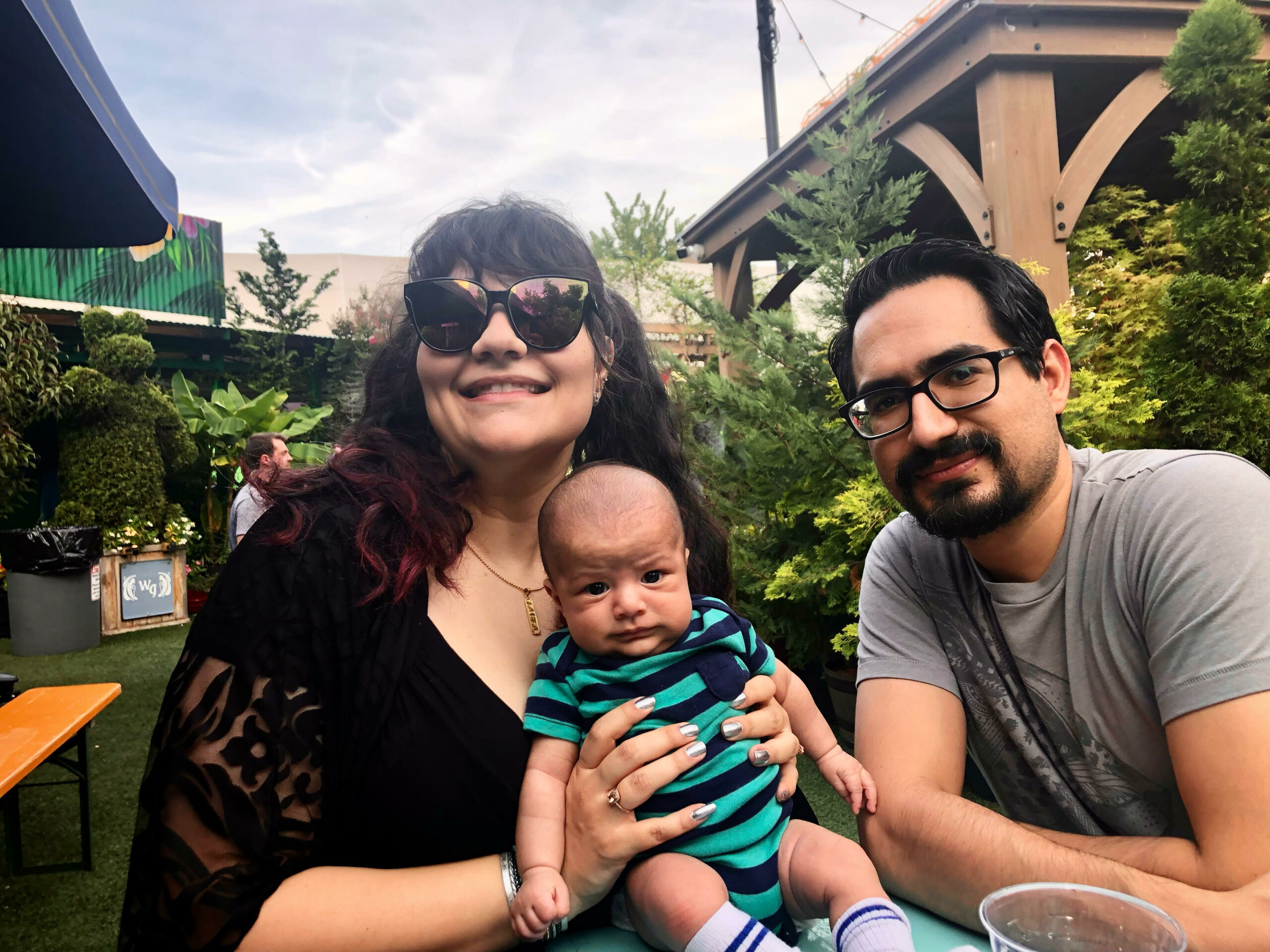A Late Father’s Day Tribute to my Husband, a New Dad
Less than a week after my emergency C-section, while I stayed home, unable to stand up on my own, let alone take more than a few steps at a time, my husband and father-in-law bundled up our newborn for his very first well-child visit.
Of course, while our circumstances were extenuating, the situation really wasn’t; if doctors hadn’t sliced through my abdominal muscles mere days earlier, I would have physically appeared at the appointment, but my husband would have as well—our son is his child as much as he is mine, after all.
And yet, the staff at the pediatrician’s office was surprised to see them—“we don’t get many men here,” the receptionist confessed.
While society has increasingly embraced gender equality in many arenas, childbirth and childrearing continue to lag behind and are still often seen as predominantly women’s responsibility, one which men might be increasingly expected to “help out” with but still not take actual ownership of as equal partners.
As we set up the nursery in the days leading up to the birth of our son, my husband and I noticed that the overwhelming majority of the toys and other products we unpacked came with notes addressed to “mama.” Very few acknowledged that a parent of another gender might be equally involved in childcare (or that there may not even be a mama in the picture, as is the case with a small but growing number of American families, whether headed by a single father or by men in a same-sex partnership).
A full 53% of Americans say that, even after excluding breastfeeding, mothers are generally better at caring for a new baby than fathers are, while a shocking 29% don’t believe it’s equally important for babies to bond with their fathers as with their mothers.
Unfortunately, this systemic devaluing of a father’s role in raising children is reflected in the childcare statistics as well. While millennial fathers are much more involved than those of earlier generations—on average, dads spend three times as much time with their children now as they did two generations ago—women continue to do the majority of childcare. Amongst American adults living with children under 18, women spend twice as many hours per week on childcare as men, and even in households where both parents work full time, a larger share of parenting responsibilities are held by mothers.
Pop culture has often toyed with the idea of a mythical society in which women are able to reproduce on their own, but that’s not the world we live in. And, as long as men play an equal role in conceiving children, they should play an equal role in raising them
I may have been the one to physically carry our son within my body for close to a year, but pregnancy, childbirth, and now parenting have all been joint ventures. My husband has been by my side throughout, picking up the slack and providing me a shoulder (at times quite literally) to lean on.
When my husband and I were born in the late eighties, fathers being present in the delivery room was a fairly new phenomenon; when our son was born, not only was it common, but very much expected. In the “Baby-Friendly hospital” in which I delivered, standard operating procedure accounts for the presence of an active “birth partner” who fulfills many of the roles once performed by nurses. In fact, when selecting the hospital where I would give birth, a quick scan of Google reviews revealed that the few negative experiences I saw were written by women who had gone through labor and delivery alone, leaving them without help to recover.
In a similar generational shift, 97% of millennial fathers participate in diaper changes; in 1982, 40% of dads said they had never changed a single diaper.
Meanwhile, my husband handled 100% of diaper changes in the first week and a half of our son’s life while I was confined to my bed. That count quickly evened out, however, in the following weeks when my husband returned to the office and I remained on maternity leave, making me the primary caregiver by default.
I have not been alone in this experience; in fact, our family is lucky that my husband was able to take any time off at all.
The majority of American companies do not provide paternity leave benefits. Just 40% offer paid leave for parents of both sexes (up from 25% as recently as 2015!), and paternity leave is almost always significantly shorter than maternity leave even when it’s granted. (The solution, for what it’s worth, is not government-mandated parental leave, which negatively impacts women’s equality in the workplace, but rather a cultural shift towards better benefits for all parents, which can actually improve companies’ bottom line.)
Of course, there is some degree to which the discrepancy between maternity and paternity leave may be justified by (cisgendered) men and women’s inherent biological differences. My husband couldn’t have carried our child in utero if he had wanted to, and (as I have frequently ruefully lamented his “ornamental nipples” while nursing our newborn in the wee hours of the night) he is equally useless for breastfeeding.
However, while maternity leave is just as much a medical leave of absence in which postpartum mothers must take time to physically recover from childbirth as it is an opportunity to fully focus on parenthood in the crucial first few weeks of a child’s life, the latter is no less important than the former.
Fathers who take paternity leave are 250% more active in their children’s lives than those who don’t—even long after the leave is over. This has a huge impact: children with involved fathers do better on nearly every measure of child wellbeing, ranging from increased cognitive development to better educational achievement, healthier self-esteem, and lower likelihood of teen pregnancy and time spent in jail.
Contrary to the popular belief that fathers are uninvolved and largely unnecessary, dads play an essential role in childrearing, and, as an increasing number of young men are realizing, active fatherhood matters deeply.
In 46% of American families, both parents work full time, and in just 52% of these families, the father is the primary breadwinner. The days in which a “good father” was one who went to work and earned money to put food on the table, but otherwise did little around the home, are long gone. The modern father is increasingly involved in the day-to-day care of his family and his home (as he should be!), and deserves both credit for those contributions and societal support to be able to fulfill this vital role.
My husband is my partner in parenthood as in life, and, as difficult as new motherhood can be, it would be near impossible without his active participation on a daily basis. I would frankly have been hard pressed to have even written this column if he hadn’t been watching our son while I did.
Just as government policies frequently lag behind societal attitudes and cultural change, the lens through which we view the world is often clouded by the expectations and attitudes of the past. Though childrearing remains one of the few spheres in which we are far from achieving gender parity (resulting in spillover effects in many other areas as well), millennial fathers are increasingly stepping up to the plate. It’s high time that both our cultural narrative about parenthood and the policies that impact it are updated to reflect that.





